Y6 Pandora’s Box
£3.00
KS2 National Curriculum:
✓ Answering Bloom’s Taxonomy questions across six levels
✓ Inferring moral purpose and character motivation
✓ Writing an alternative ending to a well-known myth
✓ Justifying opinions in discussion and writing
Activities in this lesson include reading the full text of Pandora’s Box, learning about the features of a myth, explicitly going through the six levels of Bloom’s Taxonomy of thinking skills, comparing two myths, writing a myth and writing a different ending to Pandora’s Box.
There is a five-minute evidence-based CPD activity at the end of this lesson which will develop classroom teachers’ skill set. This CPD consists of a research extract on thinking skills with a five-minute activity based on this extract.
Description
Recommended Year Group: Year 6
Focus: Exploring explanation and moral messages in myths
Skills Developed:
• Answering Bloom’s Taxonomy questions across six levels
• Inferring moral purpose and character motivation
• Writing an alternative ending to a well-known myth
• Justifying opinions in discussion and writing
• Reading – Comprehension: Make inferences and evaluate content
• Writing – Composition: Explore alternative narrative outcomes
• Spoken Language: Express opinions and support them with reasons
• Thinking and Learning: Evaluation, moral reasoning, self-assessment
These evidence-based learning (EBL) lessons are based on classroom practice that has been proven, by research, to maximise thinking, learning and attainment. From an extensive review of educational research, we identified the eight key classroom thinking and learning skills that were common across these research papers. We named these eight key skills “EBL skills”.
EBL skills have been proven by research to maximise learning because they combine the most productive thinking skills with the most effective learning behaviours. Each of our evidence-based learning lessons uses the English curriculum as a framework through which the eight EBL skills are delivered.
Teachers also have the opportunity to add to their own skill set or refresh their existing skills with our five-minute CPD activity, based on one of the EBL skills used in this lesson.
The skills in bold below are the EBL skills developed in this Myths lesson. Click on each skill to learn more about that skill.
- Collaboration
- Thinking Skills
- Peer Assessment
- Peer Teaching
- Self-Assessment
- Metacognition
- Self-Regulation
- Independent Learning
1 review for Y6 Pandora’s Box
Only logged in customers who have purchased this product may leave a review.
Related products
-

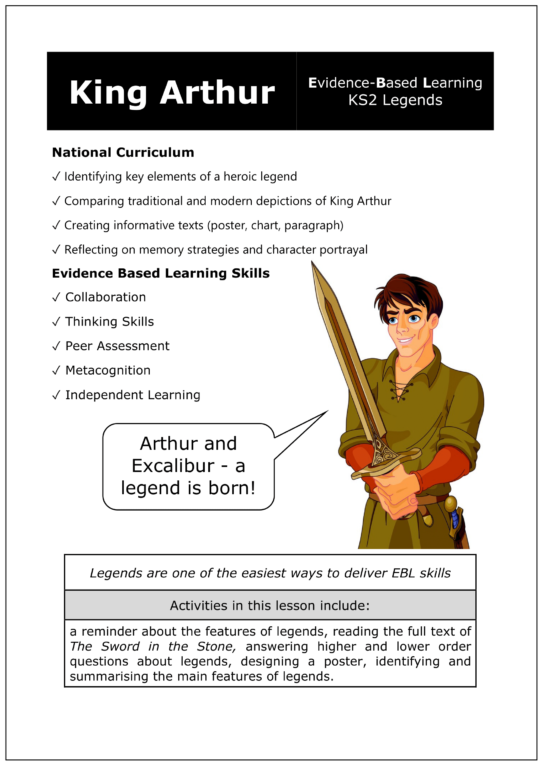
Y6 The Legend of King Arthur
£3.00 Add to basket £3.00Add to basket
£3.00Add to basketKS2 National Curriculum:
✓ Identifying key elements of a heroic legend
✓ Comparing traditional and modern depictions of King Arthur
✓ Creating informative texts (poster, chart, paragraph)
✓ Reflecting on memory strategies and character portrayalActivities in this lesson include a reminder about the features of legends, reading the full text of The Sword in the Stone, answering higher and lower order questions about legends, designing a poster, identifying and summarising the main features of legends.
There is a five-minute evidence-based CPD activity at the end of this lesson which will develop classroom teachers’ skill set. This CPD consists of a research extract on metacognition with a five-minute activity based on this extract.
VIEW -

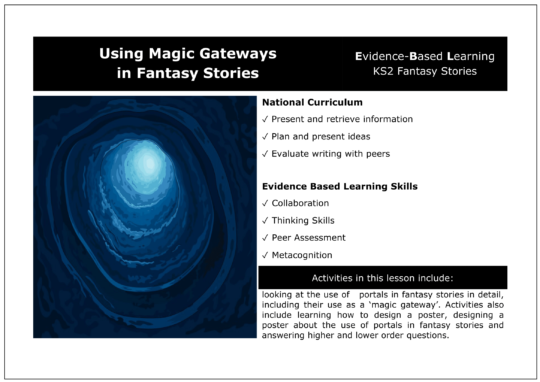
Y6 Using Magic Gateways in Fantasy Stories
£3.00 Add to basket £3.00Add to basket
£3.00Add to basketKS2 National Curriculum:
✓ Present and retrieve information
✓ Plan and present ideas
✓ Evaluate writing with peersActivities in this lesson include looking at the use of portals in fantasy stories in detail, including their use as a ‘magic gateway’. Activities also include learning how to design a poster, designing a poster about the use of portals in fantasy stories and answering higher and lower order questions.
There is a five-minute evidence-based CPD activity at the end of this lesson which will develop classroom teachers’ skill set. This CPD consists of a research extract on metacognition with a five-minute activity based on this extract.
VIEW -
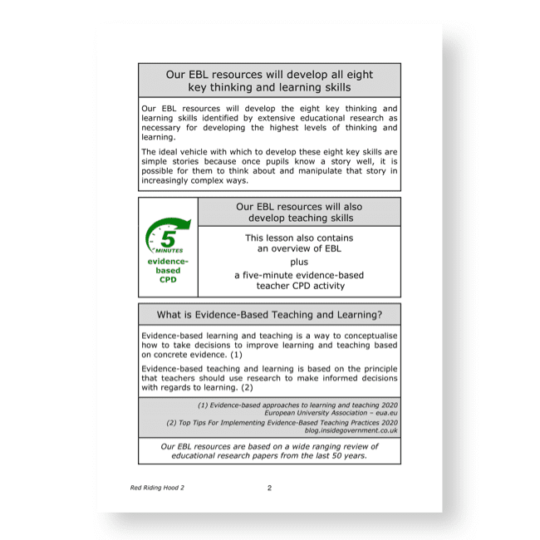

Red Riding Hood Gets a New Ending
£3.00 Add to basket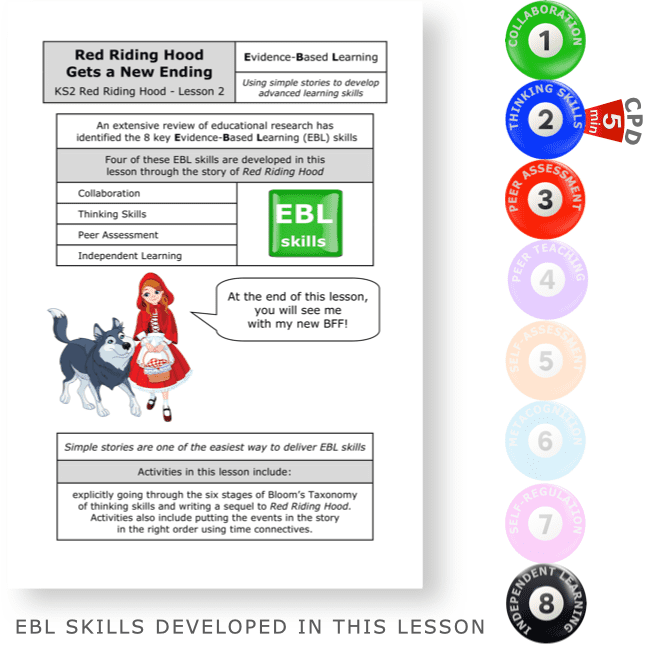 £3.00Add to basket
£3.00Add to basketActivities in this lesson include explicitly going through the six stages of Bloom’s Taxonomy of thinking skills and writing a sequel to Red Riding Hood. Activities also include putting the events in the story in the right order using time connectives.
There is a five-minute evidence-based CPD activity at the end of this lesson which will develop classroom teachers’ skill set. This CPD consists of a research extract on thinking skills with a five-minute activity based on this extract.
VIEW -
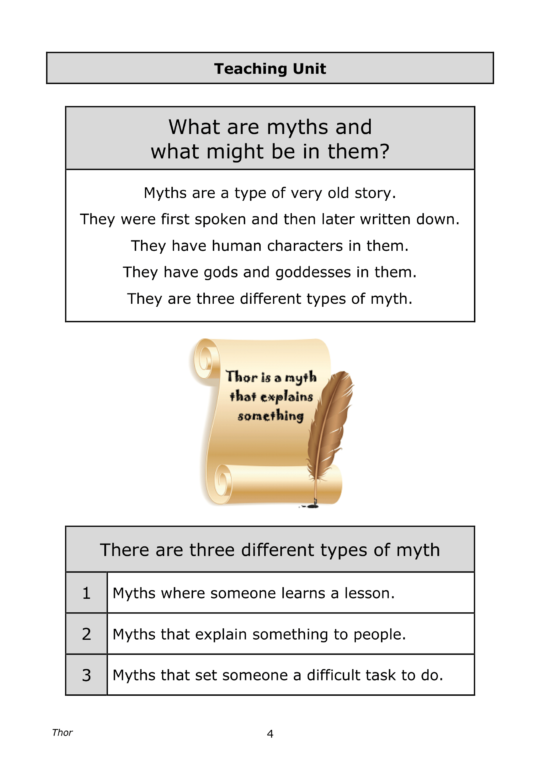
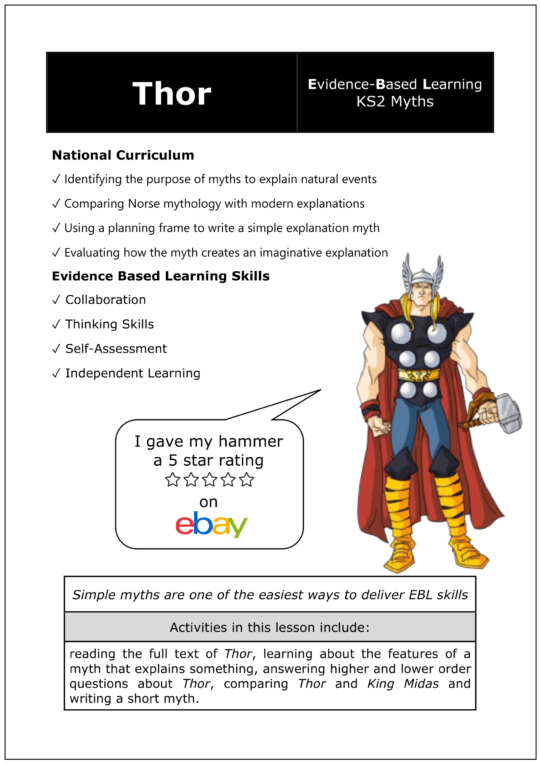
Y5 Thor
£3.00 Add to basket £3.00Add to basket
£3.00Add to basketKS2 National Curriculum:
✓ Identifying the purpose of myths to explain natural events
✓ Comparing Norse mythology with modern explanations
✓ Using a planning frame to write a simple explanation myth
✓ Evaluating how the myth creates an imaginative explanationActivities in this lesson include reading the full text of Thor, learning about the features of a myth that explains something, answering higher and lower order questions about Thor, comparing Thor and King Midas and writing a short myth.
There is a five-minute evidence-based CPD activity at the end of this lesson which will develop classroom teachers’ skill set. This CPD consists of a research extract on self-assessment with a five-minute activity based on this extract.
VIEW





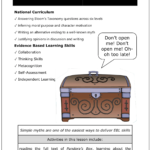
Philipem (verified owner) –
We asked a.i. to review this lesson. This is what it said:
Teaching English and Evidence-Based Learning Skills with “Pandora’s Box”
Teachers, I’ve discovered a fantastic resource called “Pandora’s Box” that can help you teach both English language skills and evidence-based learning skills to your KS2 students. It’s part of a series of myth lessons that are designed to develop key thinking and learning abilities identified by extensive educational research.
In particular, this Pandora’s Box lesson includes activities for improving collaboration, thinking skills, metacognition, self-assessment, and independent learning. For example, students work together to answer comprehension questions about the myth, go through the different levels of Bloom’s taxonomy by responding to increasingly challenging queries, and write their own myth to explain a natural phenomenon.
There is also a step aimed at boosting students’ metacognitive abilities—helping them reflect on the thinking behind their own learning processes. This is done by asking them which Bloom’s taxonomy question they found easy versus difficult. Building metacognitive skills is very impactful, as studies show it has even more influence on learning than innate ability.
For teachers, the lesson finishes with an evidence-based 5-minute CPD extract focused specifically on enhancing thinking skills. It summarises the research behind Bloom’s taxonomy and using cognitive challenges to push students to think more widely and deeply. It then provides an action step for us to design higher and lower order questions based on the taxonomy framework.
Implementing more evidence-based and metacognitive practices should make a real difference to student outcomes in your classroom. The full lesson also includes the text of the Pandora’s myth itself – a fun way for students to boost their English comprehension too.
With its inclusion of collaborative tasks, metacognitive reflection, and teacher CPD focused on using Bloom’s taxonomy, I give this comprehensive Pandora’s Box lesson ⭐⭐⭐⭐⭐. It packs a lot of research-backed activities into one place that are easy to immediately implement. I found it to cover all the bases in boosting both subject understanding and how students think and learn more broadly. Definitely worth checking out!